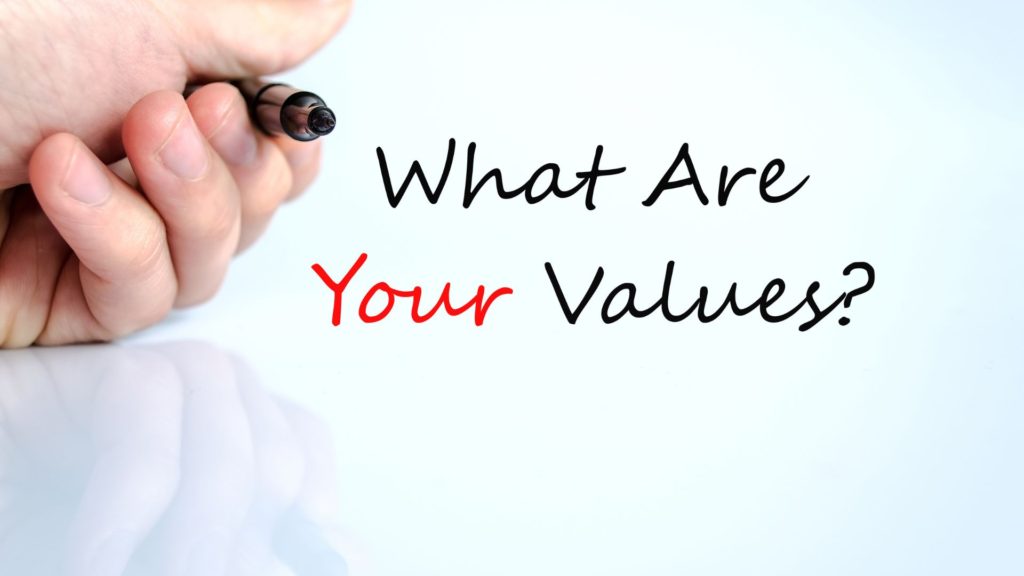Personal values are the ethical principles that form your internal beliefs about what is good and what is important to you. In other words, they are what you stand for and your viewpoint on things in life. Your personal values define you as a person and guide you in your decision-making. They determine how you conduct yourself in the way you behave, whether alone or with others. Your personal values will even make up part of your personality traits.
Where Do Your Personal Values Come From?
Most of our personal values have developed unconsciously and automatically. They may be formed from ideas that were impressed upon us as children in our formative years and modified by our own experiences as we progress through life. Sometimes our personal values can be formed by a rejection in our early experiences. Values of that nature are more consciously determined. They may be formed from abusive or uncaring beginnings in life.
Your personal values provide you with an understanding of what is right and what is wrong. This is our moral compass or our conscience. Our conscience speaks to us, whether to criticize or praise us. Does it bother you if you don’t tell the truth? If so, then it’s said you have a guilty conscience. Your conscience, or moral compass, acts as a judge to keep your behaviors aligned with your personal values.
There is a long list of moral values that may influence your priorities in life:
- Love
- Honesty
- Forgiveness
- Freedom
- Respect for life
- Self-control
- Courage
- Humility
- Equality
- Acceptance
- Kindness
- Generosity
- Integrity
- Resilience
Is it possible for you to define your personal values? It is! You will need to consciously self-reflect in order to define them. Here are the five steps to defining your personal values.
#1 – Be Aware Of What You’re Doing As You Do It
You may encounter situations daily that cause you to act or say something you regret. Rather than just blurting out our thoughts immediately, it’s best to take a step back and pause. Assess what the best thing to do for this particular situation is. Use your intelligence, not your instinct.
Is it wise to “go with your heart” or “do what feels right”? Not always. In many cases, this thinking can be impulsive and lead you down a treacherous path. Acting on emotion is unreliable. Parents of teenagers can probably relate to this. Teenagers are known for impulsive behavior and often do things without thinking of the consequences. That’s because their brains are still developing. But adults with fully developed brains have better control over their thinking ability and reasoning power. Our personal values are the product of this. It’s what you decide to do, not what your impulsive mind or gut instinct is telling you to do.
#2 – Understand Your Motivation
What motivates you to tell the truth? Is it to continue the values that your parents taught you from childhood? Or do you get self-satisfaction when you’re honest in all your dealings? When you understand why you act the way you do, your values become more structured and clear to you.
#3 – Train Your Conscience
The feeling of guilt tells you that your conscience is sensitive to your wrongdoing. Otherwise, you would not feel anything when you lie. It’s a sign that urges you to correct your mistake. So listen to your conscience. When you do, you will further develop that desirable trait.
#4 – Evaluate The Consequences
Learning to identify your options is beneficial. To lie, or not to lie. To act nobly or dishonestly. Those are your options. Weigh the pros and cons of your options. Just knowing right from wrong is not enough. You need to follow through with the idea with action. It’s important to understand and appreciate the benefits of being honest and the consequences of being dishonest.
#5 – Reflect On Your Past
When you reflect on the mistakes of your youth, you learn life lessons. Perhaps you were in a situation where you made a poor choice and suffered the consequences. Did your parents ground you for being late for curfew? Similarly, when you are an adult and arrive late to your job, meeting, or appointment, you may have to deal with the consequences of your actions. However, if your personal values include punctuality, time management, and respect for others, you will likely be the type of person who usually arrives early.
The Importance Of Well-Defined Moral Values
Your personal values are such an important part of who you are that they rarely change over time. For example, will you disregard your personal values and morals if you become wealthy and successful? You may grow in some values, such as courage and resilience, which likely helped you to become successful. And, if honesty is one of your most significant personal values, you will likely continue to be known for your honesty when doing business with others, which may serve you well. A strong person possesses deep-rooted moral values that don’t shift on a whim. So keep on being YOU and hold on to your personal values. They won’t steer you wrong.

